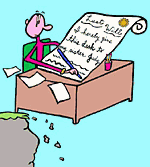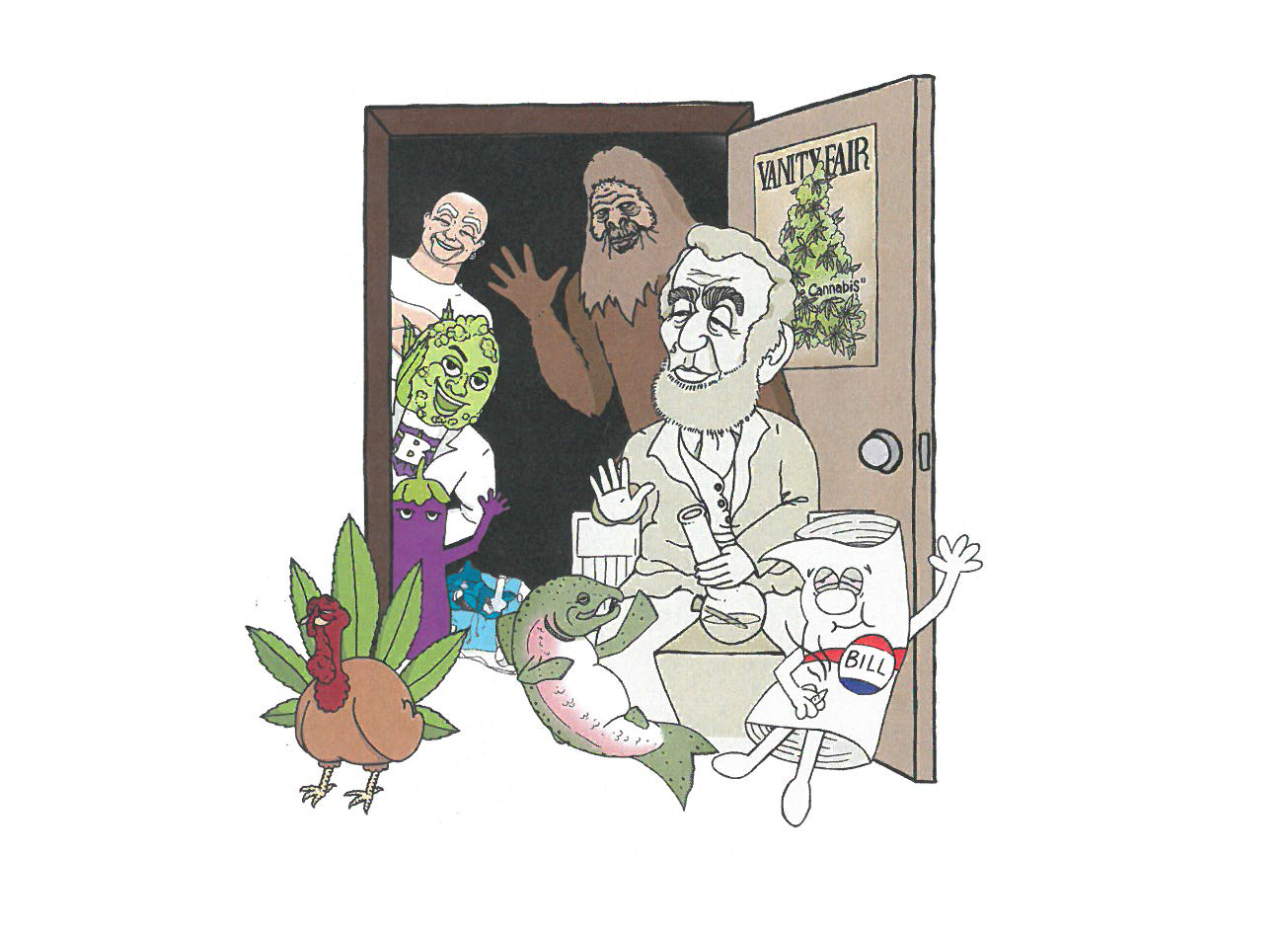I DON’T SPEND a lot of time thinking about death, mainly because it seems a long way off. My thoughts on the matter are normally limited to what I see on the six o’clock news and the Poltergeist movies. Writing a will, however, forced me to think not only about my own death, but who I’d unload all my crap on once the big dirt nap actually took place.
My parents provided the impetus. “Listen, you’re not getting any younger,” said my mother after a meeting with their own pack of lawyers, estate planners, and tax avoidance specialists. “And to your father’s and my surprise, you’ve somehow managed to possess assets.” Their suggestion may have been selfishly motivated—after witnessing my eating habits for the last 35 years, they’re probably entertaining thoughts of outliving me.
Still, I found all sorts of reasons to write my will: Aside from dividing the loot, the document can lay out the vital details of your afterlife, such as the dress you’d like to be buried in, where the stash is, and the exact location of your life insurance policy. The best reason, though, is that in most states, if the grim reaper nabs your ass and you’re without one, your possessions will become property of the state. And you know what the bureaucrats will do with the bounty: have a giant garage sale and use the proceeds to fight the war on drugs—probably not what you or your heirs had in mind.
My first draft read more like a mission statement than a means of property allotment, as I’d found a new soapbox from which to preach. Last will and testament: a two-part document, the second of which allows the author to spew big-picture philosophies, given all the more weight in that they seemingly arrive from the great beyond. I spewed for 30 single-spaced pages. After venting about bigotry, environmental degradation, improper parenting techniques, and a few old grudges (yes, Frank Kingsley, you bastard, you still owe me $350!), I returned to divvying up my stuff.
Rather than pay a lawyer to help craft my will (thus reducing my beneficiaries’ inheritance), I purchased a Legal EZ Form—one of those fill-in-the-blanks numbers. They’re sort of like Mad Libs, but hold up in a court of law: “I (full name) of sound mind and (adj.) body do solemnly (cuss word) swear and (verb) this (adj.) manuscript is my own. . . .” Pretty basic stuff.
I also looked over a few wills of the rich and famous on the Internet for inspiration. Elvis’ was fairly straightforward (“thankyouallverymuch”), as was JFK’s—they both probably thought they’d get to write another draft. The Branch Davidians had intriguing clauses on withholding taxes that I chose not to incorporate. I liked Ben Franklin’s decree best; he was terse yet specific: “The King of France’s picture, set with 408 diamonds, I give to my daughter Sarah, requesting that she would not form any of those diamonds into ornaments either for herself or daughters.”
I’VE GLEANED MOST of my treasures from garage sales and junkyards: street signs, vintage glassware, and stolen ashtrays. My most valuable possession is my house, and my folks threw in the down payment, so I should give it back to them. After paying off the bank, back taxes, and the real estate vultures, maybe they’ll have enough to take a cruise. I also own a car, which I willed to my girlfriend Jenny, as she’s totaled all hers (speaking of wills). All my threads are bequeathed to my best friend Doug; the poor chap needs a clothing consultant worse than Cher.
My only other items of value are a book collection and a set of masks I’ve acquired in my travels. My concern about leaving these to specific people was that the beneficiaries might get the wrong impression. There’d be no way to tell my ex that Crime and Punishment had nothing to do our relationship, only that I knew she admired Dostoevsky. The two-faced drama mask earmarked for TJ was to encourage his career as a thespian, not comment on his penchant for talking out of both sides of his mouth. And what of my soap collection: How would Jake “Pigpen” Goldstein take that bequest?
So what about the cash? The cool, crisp green stuff? As Howard Hughes said, “That’s what they’re really after!” After paying off VISA, Mastercard, Discover, the library, and the funeral home (it seems tacky not to pay for your own entombment), what little remains in my savings account is granted to Greenpeace—something I can point to in discussions with Saint Peter, or whoever runs heaven for the Jews (probably George Burns). As for the rest of my “portfolio,” I threw it all to my loving sister Pamela (30 shares of Microsoft purchased in ’93, now worth around $30 million).
In terms of the burial, I laid down specifics. A metal coffin seems a good idea; I have no interest in becoming mulch or food for earthworms. Being hermetically sealed would also be advantageous should they come up with a miracle cure, enabling well-preserved corpses to get a second chance.
Finally, every will has that all-important section on “power of attorney.” This authorizes a person to pay your bills in the event you’re knocked into a coma or become mentally impaired from too much drinking or Alzheimer’s. My clause on this is pretty clear-cut: “Pull the plug, baby!” I’ve heard the stories of people who “come out of it” 27 years later, and that’s nice—for them. Me, I don’t want to nap that long. I can think of nothing worse than sitting in a vegetative state while a bunch of distraught friends and family hold my hand day after day and tell me stories I can’t respond to. Talk about not getting a word in edgewise.
INHERIT THE WIND: After four months of rewrites, my worldly goods were distributed, my disposal laid out in gory detail, and minor details such as who’d be the guardian of my kids were enclosed as well. Now it was necessary to have a copy reviewed by a clan of lawyers, notaries, and rabbis. For legalistic validity (probate) the document must be witnessed by two suckers not named in the archive (sorry, Erin and Ted, you just didn’t make the cut). It was then signed in triplicate and notarized.
As I stood in front of the post office, my will sealed and ready to be mailed to my lawyer, something prevented me from completing the task. Were these indeed my last wishes? Pretty much. Was everybody included? I think so. Was I paranoid the beneficiaries were going to have me killed? Not really. My problem had nothing to do with content and everything to do with superstition. I opened the manila envelope and reread my opening line:
“I, Michael A. Stusser, of sound mind and body, fervently believe that once you write a will, you’ll need to use it. If you’re reading this, I was right.”
I tore the sucker to shreds and burnt it in a celebratory pyre in my Caesar’s Palace ashtray. Everything in due time.








